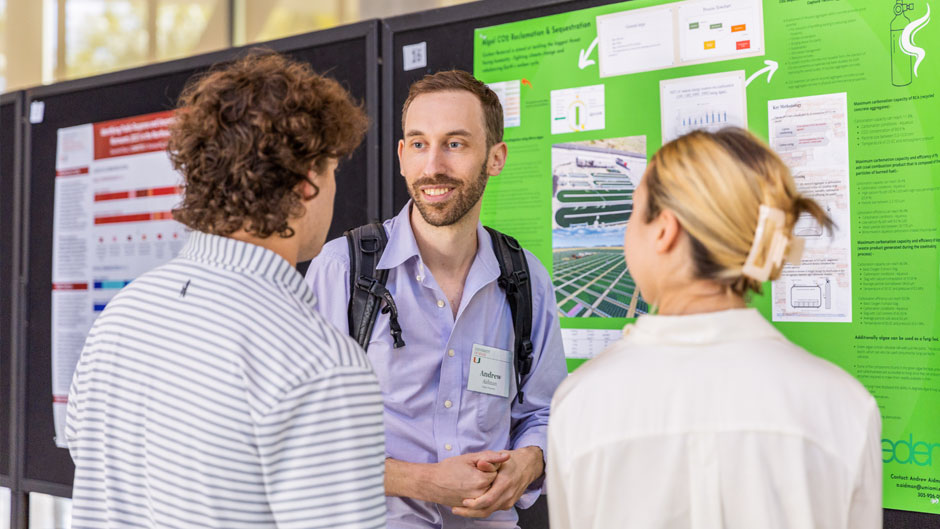Following the official launch of the Climate Resilience Academy—the new interdisciplinary research and instructional hub—on Earth Day, the University hosted the inaugural symposium at Lakeside Village Expo Hall on Monday that featured Miami-Dade County’s first chief heat officer as the keynote speaker and presentations of 10 University Laboratory for Integrative Knowledge (ULINK) funded projects that propose solutions for climate-related challenges.
Rodolphe el-Khoury, dean of the School of Architecture, and Sharan Majumdar, professor in the Rosenstiel School’s Department of Atmospheric Sciences, who together led the planning process that established the foundations of the academy, welcomed students and community guests to the symposium geared to promote a resilience culture and to build momentum for the new initiative.
Jeffrey Duerk, executive vice president for academic affairs and provost, noted that the inaugural symposium—a green certified event—represented the aims of the academy to address climate and resilience issues collaboratively and across multiple disciplines.
“This first symposium, which brings together a community of scholars, serves the University’s mission as a convener but even more importantly extends beyond convening and studying to ultimately deploying solutions and finding solutions that are actionable,” Duerk said.
Eric T. Levin, a former University trustee and former member of the University of Miami Citizens Board, described his motivation to donate $5 million toward the initiative, a gift that propelled the formation of the academy.
“Climate change is the challenge of a lifetime, and here in Miami we sit at the epicenter of the climate challenge,” Levin said. “It’s imperative to get others involved to work collaboratively to tackle these big problems,” he added.
“The academy is designed to complement and enhance the University’s existing strength, to create more dialogue and form an organization platform that will foster long-lasting relationships and partnerships with stakeholders in South Florida and well beyond,” explained Levin.
He suggested that many of the projects fostered through the academy will “ultimately become entrepreneurial ventures which will implement business solutions to the stressors of climate change, create more revenue, and become self-sustaining and financially additive to the overall mission of the University.”
Keynote speaker Jane Gilbert, named the county’s chief heat officer 10 months ago and who served previously as the City of Miami’s first chief resilience officer, welcomed the call to engage a new army of advocates and experts to develop solutions for climate change and related stressors.
“It’s going to take people from across all fields—design, architecture, education, law, policy, business,” said Gilbert. “The increasing costs of extreme heat create an urgency and gives us the opportunity to reinvent how we live, move, work, and play in a resilient way.”
In contrast to the property damages from environment disasters like flooding and hurricanes that are so visually compelling, Gilbert noted that extreme heat—which impacts health, lives, and livelihood—is the deadliest weather-related killer, more devastating and pervasive than any of the other climate-related hazards combined.
“In South Florida we have chronic rising heat, and it doesn’t hit us all equally,” Gilbert pointed out. “Some people are more exposed day in and day out, and most [threatening conditions] are preventable through education, mitigation, and communication.”
She noted that her office and a recently convened climate and heat health task force are focused on developing solutions, such as a heat vulnerability assessment, and a resilience tool kit.
Ten different teams presented TED-like talks on their ULINK projects. These projects, which have been funded in their incubator phase by the University, seek broader support and financial backing that may well be provided through the partnership focus of the new Climate Resilience Academy.
This year’s projects include “Living with Spinal Cord Injuries and Climate Change: Risk and Resilience in Miami,” “Climate Gentrification: Creating Tools to Drive Community-Lead Neighborhood Resilience,” “Comprehensive Approaches to Heat-Related Equity in Miami-Dade,” and “The Future of Miami’s Main Artery: PortMiami,” among others. View a full listing of the projects.
Elvis Baffoe, a Ph.D. student in civil engineering, attended the symposium to learn more about the University’s sustainability efforts and said that he was glad he did. Baffoe maintained that looking for solutions to climate change is a practical response that many Universities should be doing.
“If we can come up with strategies to combat climate change through a symposium like this, I think it will be very beneficial to the world. And I hope the University will do this annually,” he said.
Claudio Rizzi, a Ph.D. student in finance, was at the forum to present a poster about his research on climate risk for the financial markets. However, he also enjoyed listening to the keynote speech, along with the U-LINK presentations.
“It was good to meet others doing similar work and to integrate other ideas into my finance research,” he said. “For example, I am learning that the ways different researchers are calculating pollution or assessing flood risk could be very useful to me.”

